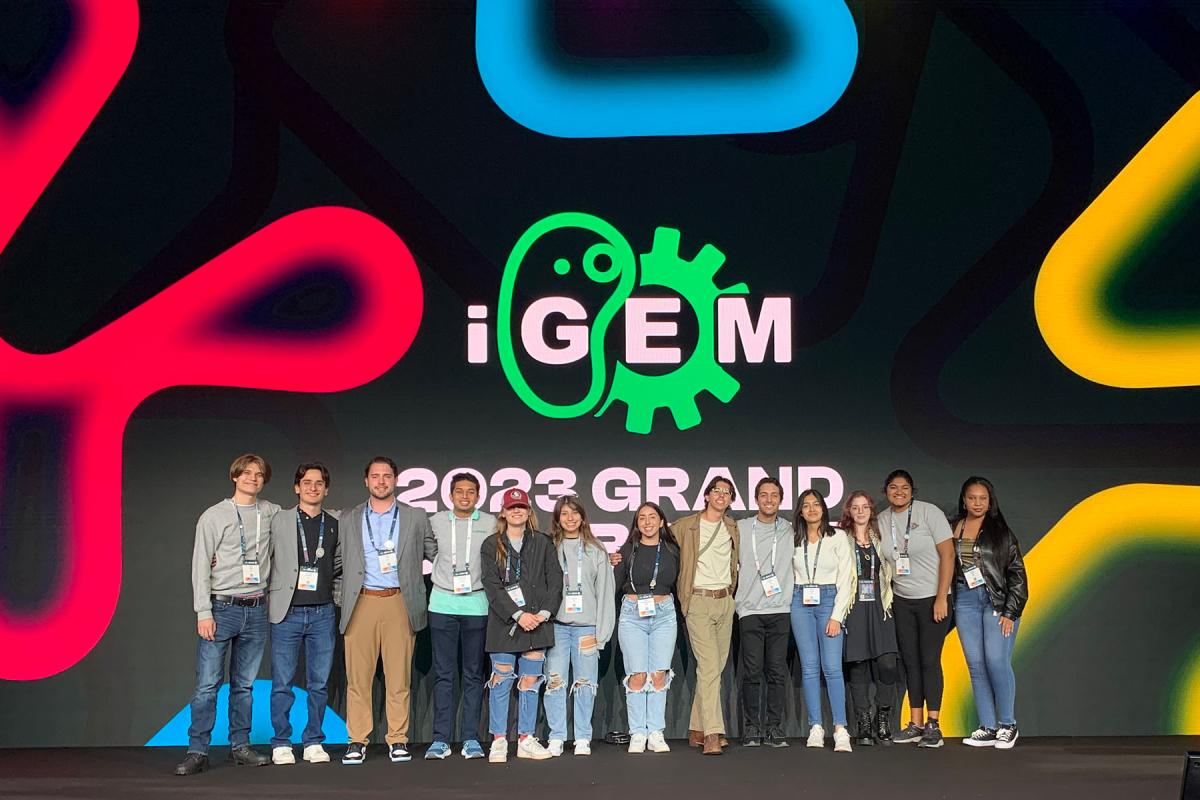FSU’s International Genetically Engineered Machine team wins silver medal in Paris for rare disease research

Florida State University’s International Genetically Engineered Machine (iGEM) team won a silver medal at an international research symposium in Paris for its work addressing a rare genetic disease.
Thirteen undergraduate students on the iGEM team presented their work at the 2023 iGEM Grand Jamboree: The World Expo of Synthetic Biology Nov. 2-5.
The team’s research focused on a therapeutic solution for a distressing body odor condition called trimethylaminuria (TMAU). Their work yielded promising results and will continue as a project within FSU’s new Institute for Pediatric Rare Diseases.
“We are so proud of the students, who sustained such hard work since they began in January on a project that may eventually help solve a real-world problem,” said Cesar A. Rodriguez, a co-principal investigator for the FSU iGEM team and entrepreneur in residence at FSU’s College of Medicine.
The team is one of over 400 from around the world to participate in the annual research symposium, which attracted researchers, industry representatives, investors, journalists and experts in governance and policy. This marks the fourth year in a row that FSU won a silver medal at the jamboree. In 2019, it won the only gold medal in the state for its project to combat citrus greening.
The team won this year’s silver medal along with 55 other undergraduate groups in their division, including Harvard University, Yale University, the Massachusetts Institute of Technology and the University of Oxford. Over 400 teams from 66 countries presented their work at the four-day jamboree in separate divisions for high school, undergraduate and graduate school students.
TMAU is a metabolic condition characterized by the body’s inability to oxidize trimethylamine (TMA) into odorless trimethylamine N-oxide (TMAO) in the digestive system. The result is a pungent decaying fish smell that emanates from every bodily fluid, which can have devastating consequences for patients.
“As we had the opportunity to talk to people with this condition, we learned it’s extremely debilitating,” said Elizabeth Moore, the team lead for FSU’s iGEM group and a biomedical engineering major. “They’re unable to hold down jobs and keep relationships. We had a really unique opportunity to find a solution for these people using synthetic biology.”
An FSU iGem blog garnered significant attention from patients who suffer from TMAU. While it’s impossible to know how many people have the condition, estimates range from 80,000 to 800,000.
One commenter wrote, “There is hope that maybe those of us who suffer from this awful disorder will finally be able to live like normal people and not be shamed by others.” Another wrote, “I am SOBBING. I can’t believe the day has come where someone finally cares enough to help us.”
The FSU iGEM team, which is divided into subgroups dedicated to engineering, entrepreneurship and human practices, developed the idea of creating a probiotic that TMAU sufferers could take with a meal that would oxidize the TMA chemical for them. It would work similarly to Lactaid, which helps those whose bodies can’t properly digest lactose.
The preliminary data were positive, and the next step is to conduct more trials. FSU’s iGEM team has already agreed to continue researching TMAU for next year’s jamboree, and FSU Health’s new Institute for Pediatric Rare Diseases will contribute $10,000 to the project.
“The students on this year’s iGEM team got to see how knowledge-gathering and hard work can lead directly to a real improvement in the world around them,” said David Montez, co-principal investigator and associate director of FSU’s Center for Undergraduate Research and Academic Engagement (CRE). “That kind of experience represents the best of what an FSU education can offer.”
The iGEM program at FSU is a shared initiative of the College of Medicine and the Center for Undergraduate Research and Academic Engagement (CRE). The program accepts students from any major and is housed in the CRE, a unit of FSU’s Division of Undergraduate Studies.
For more information, visit med.fsu.edu/igem/home.
